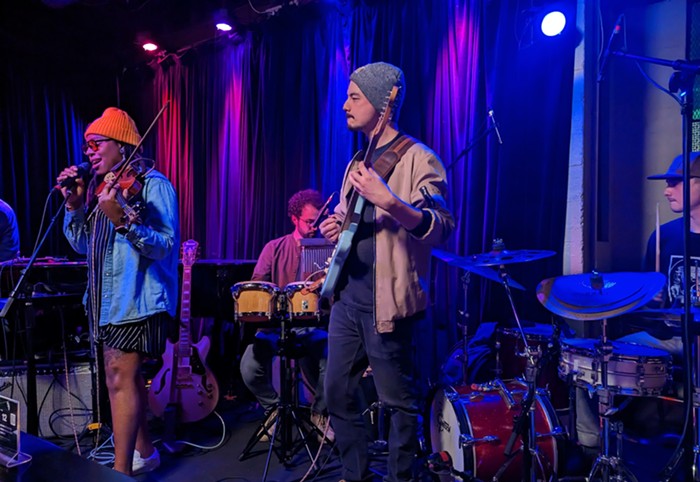TEN YEARS AGO, the Drive-By Truckers released Decoration Day, the follow-up to their breakthrough Southern Rock Opera, and their first record with guitarist Jason Isbell. To the already intimidating songwriting output of Patterson Hood and Mike Cooley, Isbell added two songs—the two best: the title track and "Outfit."
The Truckers wore their guitars right, played loud, wrote dark, toured hard, and kept a cartoonishly large bottle of Jack Daniel's at the ready on stage. Isbell, only 24 and carrying a little extra weight and a goofy grin, fit right in.
"Ten years ago I might have thought I didn't have the right to say the things an outlaw wouldn't say," Isbell sings now. "But those were different days."
It's another man altogether staring out from the cover of Southeastern, his fourth album since splitting from the Truckers in 2006. At 34, he's clear-eyed and cleaned up nice—if not exactly for church, then for a former church like the Ryman Auditorium in Nashville, which he sold out last month. It's a sober photo of a sober man who made a sober, exacting, and gorgeous record that realizes the promise of his earlier work.
Not that those earlier records were duds. "Dress Blues," from 2007's Sirens of the Ditch and "Tour of Duty," from 2011's Here We Rest are two of the best songs anyone's written about the impact of our modern wars on soldiers and families. "Alabama Pines," also from Here We Rest, was the Americana Music Association's 2012 song of the year. Last year's Live from Alabama was a perfect summation of his talents up to that moment.
But Southeastern is Isbell's MVP season. Its story starts when Amanda Shires—his girlfriend then, wife now, and maker of her own excellent new record Down Fell the Doves—made him make good on his promise to get help the next time he said he had to quit drinking. "I'm tired of answering to myself," he sings on "Traveling Alone."
He tallies the wreckage: bar fights, shot out windows, and doors slammed shut. He wrestles with fear. "Live Oak," with its shifting points of view, asks what happens if the parts you leave behind are the parts others liked. Ultimately, he finds comfort in perspective. "Compared to people on a global scale, our kind has had it relatively easy," he sings on the album-closing "Relatively Easy."
"If your problems don't change from decade to decade, if it's the same thing that's wrong, you're going to turn out to be a pretty sad person," Isbell said a few weeks ago before a soundcheck in Philadelphia.
Isbell did the difficult dance between personal and universal and pulled it off. The reward has been a lot of attention. Big sets at Bonnaroo and Newport Folk, and pieces by NPR, the New York Times Magazine, and even the CBS Evening News, where he was asked about artistic works now being calculated into the gross domestic product.
"Every little phase was good for something," Isbell said. "Even if it's one marked with a lot of anxiety, I'm glad I went through that phase. I got some songs out of it.
"I think most the decisions I've made in the last year and a half have been good decisions."



















